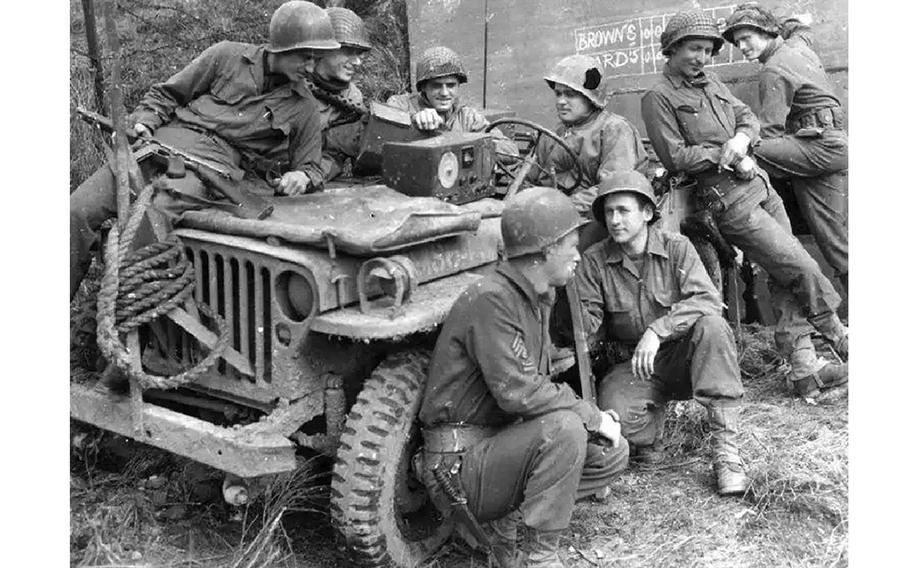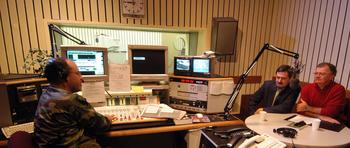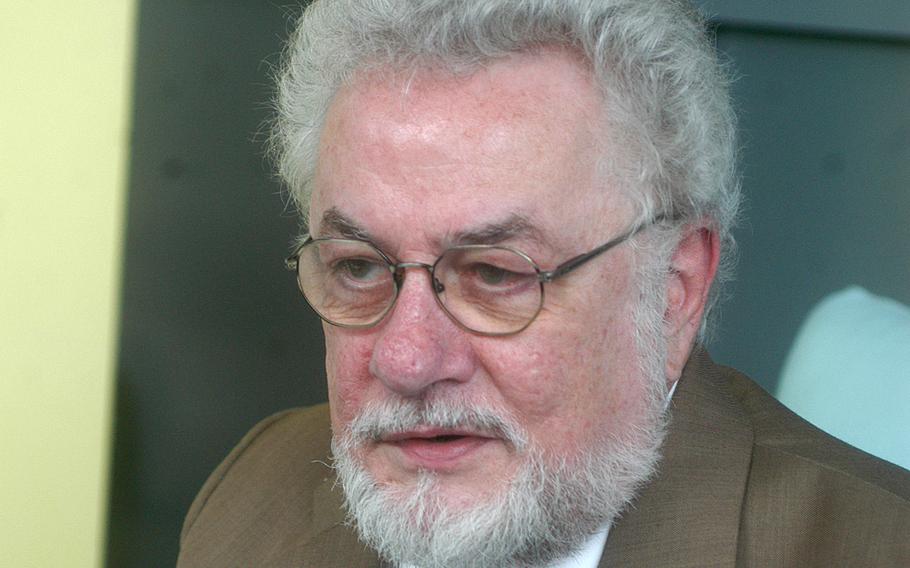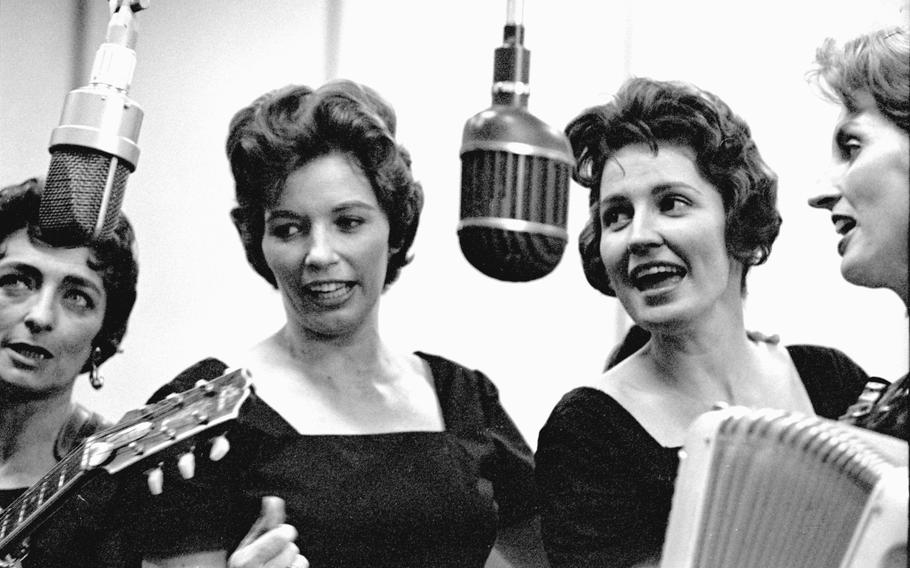
Soldiers listen to AFN on the radio during World War II. AFN is celebrating its 80th anniversary this month. Going by the writing on the wall behind them, they might have been listening to a broadcast of the 1944 World Series between the St. Louis Browns and their crosstown rivals, the Cardinals. (American Forces Network)
About two years before World War II ended, American Forces Network crackled to life for the first time in Europe, playing “The Star-Spangled Banner” in England for U.S. troops who would eventually help liberate the Continent from Nazi Germany.
Cpl. Syl Binkin took to the airwaves the evening of July 4, 1943, becoming America’s first military broadcaster.
The pioneering wartime programming was broadcast from two locations in London to keep U.S. service members “informed and entertained,” a mission that has persisted through the decades, AFN staffers say.
The military’s command information and entertainment network marks its 80th anniversary Tuesday, even as it continues to expand its reach and transform its delivery to keep pace with advances in technology.
“We’re now on the internet, we’re now streaming; we’ve got satellite delivery,” said Bill Hickman, AFN Europe chief of affiliate operations and acting deputy director.
Hickman, who began his AFN career as an Air Force DJ in 1985 at Incirlik Air Base in Turkey, recalls the days of analog, tape and radio boards. The radio feed in those early days came in over telephone lines.
On the television side, broadcasters used film and video tapes, lugging around bulky equipment that has since been replaced with more compact digital cameras.
“Keeping up with technology and making sure we have the money and the training to advance into those new technologies is probably the biggest challenge, and it will continue to be,” he said.
AFN operates 24 radio stations from Rota, Spain, to Kunsan, South Korea. Through transmitters and other means, it reaches 24 remote locations, including Kosovo, Kwajalein Atoll and Antarctica.
The network serves an audience of about 400,000 U.S. military personnel and their families at U.S. bases and embassies around the world.
In Europe, its range is expanding eastward. Since March, the U.S. has had a permanent base in Poznan, Poland, and has deployed thousands of troops to the NATO ally in response to Russia’s February 2022 invasion of Ukraine.
“It’s all remote,” Lt. Col. Adam Hallmark, AFN Europe commander, said of the programming in Poland. “We don’t have any boots on the ground (in Poland), but that may change in the future.”

Army Staff Sgt. Scott Malone, left, talks with American Forces Network news director Gary Bautell, center, and former AFN director of broadcast services Herb Glover, about the history of AFN in Frankfurt, Germany, during the last "Morning News Watch" show broadcast from the network's Frankfurt studios in 2004. (Michael Abrams/Stars and Stripes)
Meanwhile, AFN last year launched its livestreaming and video on demand app, AFN Now, with the number of subscribers now topping about 25,000, Hallmark said. Earlier this year, the app livestreamed the Super Bowl overseas.
Even as the network grows the app and expands its presence on social media, it remains committed to radio, Hallmark and Hickman said.
“The reach of radio is still exponentially higher than some of this new technology,” Hickman said. “Every commissary that you walk into, AFN is on. In offices, in cars … radio is a commodity that (people) use every day.”
Over the years, some notable characters and celebrities have graced AFN’s airwaves.
Most well-known is probably Adrian Cronauer, thanks to his over-the-top portrayal by Robin Williams in the 1988 movie “Good Morning, Vietnam,” named after Cronauer’s signature greeting.

Adrian Cronauer, the AFN disc jockey portrayed by Robin Williams in "Good Morning, Vietnam,” during a visit to RAF Mildenhall in England in 2004. (Stars and Stripes)
“I don’t think Adrian Cronauer, even in his heyday, was quite as flamboyant on the air as the character was in the movie, but we have had some wonderful and absolutely engaging personalities,” Hickman said. “In a lot of places, some of our reporters, our DJs were local celebrities. The audience really enjoyed what they did for them and how they did it.”
Before Pat Sajak snagged his “Wheel of Fortune” hosting gig, he broadcasted from the same AFN station in Saigon as Cronauer.
George Clooney’s dad and Johnny Cash’s younger brother were AFN DJs at different times in Frankfurt, Germany, Hickman said.
One of the most recognized voices in Europe was that of Gary Bautell, who died last year after a storied career with AFN that spanned more than 60 years.
“We have had a really deep legacy of wonderful individuals and dedicated folks who worked this job over the years,” said Hickman, who figures he heard Bautell as a baby on AFN when his Army dad was stationed in Germany in the 1960s.
AFN’s scope has since expanded beyond the active-duty sector, he said, as AFN also aims its command information at family members and civilians affiliated with the U.S. military.
Its broadcasters over the years have delivered news on site for some of the most historic moments in Europe, including the Nuremberg trials following World War II and the fall of the Berlin Wall in 1989.
One of Hickman’s most memorable days on the job was when President Bill Clinton visited Aviano Air Base, Italy, in 1999 to thank U.S. fighter pilots for the 11-week air campaign that helped force Serbian leaders to accept a Western peace plan for Kosovo.
Clinton was late, requiring Hickman and his colleague, who were on air live, to fill the lag. Hickman fortunately had “a stack of prep material,” he recalled. “We kept going for about 35 minutes … and it went off without a hitch.”

The Carter Family — mother Maybelle, June (the future wife of Johnny Cash), Anita and Helen — on the air at AFN's studio in Frankfurt, Germany, in 1961 during their two-week tour of U.S. bases in Europe. (Stars and Stripes)